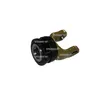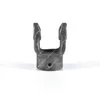A Plain Bore Yoke is a mechanical component used in various industrial applications, particularly in power transmission systems. It is designed to connect shafts or other rotating elements without the need for keyways or splines, relying instead on a smooth, cylindrical bore that fits directly onto the shaft. This type of yoke is often utilized in universal joints, couplings, and driveline assemblies where simplicity, ease of installation, and cost-effectiveness are prioritized. Plain Bore Yokes are commonly made from materials like steel or stainless steel to ensure durability and resistance to wear and corrosion.
Below is a detailed table outlining the standard parameters for our Plain Bore Yoke products. These specifications are based on industry standards and can be customized to meet specific requirements.
| Parameter | Description | Standard Range |
|---|---|---|
| Bore Diameter | The inner diameter of the yoke bore, measured in inches or millimeters. | 0.5" to 4" (12.7 mm to 101.6 mm) |
| Material | Primary material used in manufacturing, affecting strength and corrosion resistance. | Carbon Steel, Stainless Steel (Grade 304 or 316), Alloy Steel |
| Hardness | Rockwell hardness scale (e.g., HRC) to indicate material durability. | HRC 20-40 (depending on material and treatment) |
| Load Capacity | Maximum torque or axial load the yoke can handle without failure. | Up to 500 Nm (Newton-meters) for standard sizes |
| Operating Temperature | Temperature range within which the yoke performs optimally. | -40°C to 150°C (-40°F to 302°F) |
| Finish | Surface treatment applied for protection and aesthetics. | Zinc Plated, Black Oxide, Powder Coated, or Plain |
| Weight | Approximate weight per unit, useful for logistics and installation planning. | 0.5 kg to 10 kg (1.1 lbs to 22 lbs) |
Plain Bore Yokes are widely used in industries such as automotive, agriculture, manufacturing, and heavy machinery. Common applications include:
What is the main advantage of using a Plain Bore Yoke over a keyed yoke?
The primary advantage is ease of installation and removal, as it does not require matching keyways or precise alignment. This reduces assembly time and costs, making it ideal for applications where frequent disassembly is needed or where simplicity is valued.
How do I select the right bore size for my shaft?
Measure the outer diameter of your shaft accurately using calipers, and choose a yoke with a bore diameter that matches or is slightly larger (within tolerance limits) to ensure a snug fit. Consult our size chart or contact our technical support for guidance based on your specific application requirements.
Can Plain Bore Yokes handle high-torque applications?
Yes, but it depends on the material and design. Our yokes are manufactured from high-strength steels and undergo rigorous testing to handle torque up to 500 Nm. For higher torque needs, we recommend opting for custom solutions or additional securing methods like set screws.
Are there any maintenance requirements for these yokes?
Plain Bore Yokes are low-maintenance components. Regular inspections for wear, corrosion, or damage are advised, especially in harsh environments. Lubrication may be necessary if used in high-friction applications, but generally, they require minimal upkeep due to their durable construction.
What materials are best for corrosive environments?
Stainless steel, particularly Grade 316, offers excellent corrosion resistance and is ideal for marine, chemical, or outdoor applications. For less aggressive environments, carbon steel with a protective finish like zinc plating can be sufficient and more cost-effective.
Can I customize a Plain Bore Yoke for non-standard shaft sizes?
Absolutely. We offer customization services for bore diameters, materials, finishes, and other parameters. Provide your specifications, and our engineering team will work with you to create a yoke that meets your exact needs, ensuring compatibility and performance.



